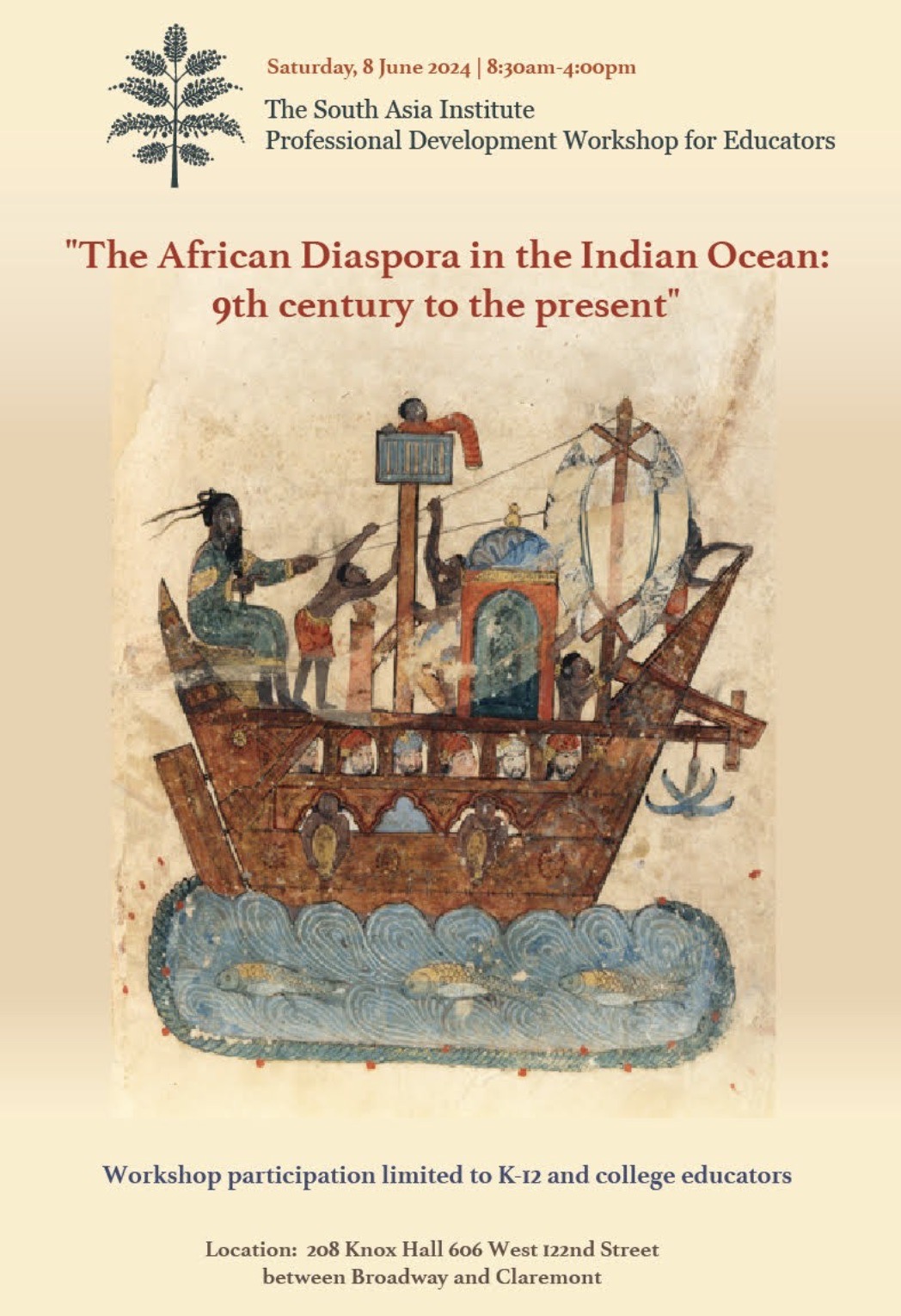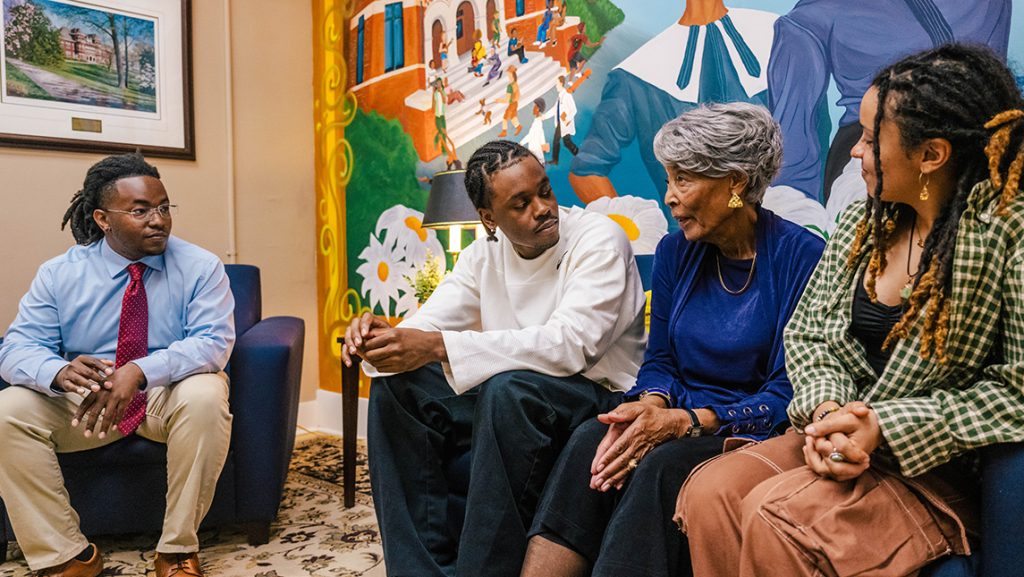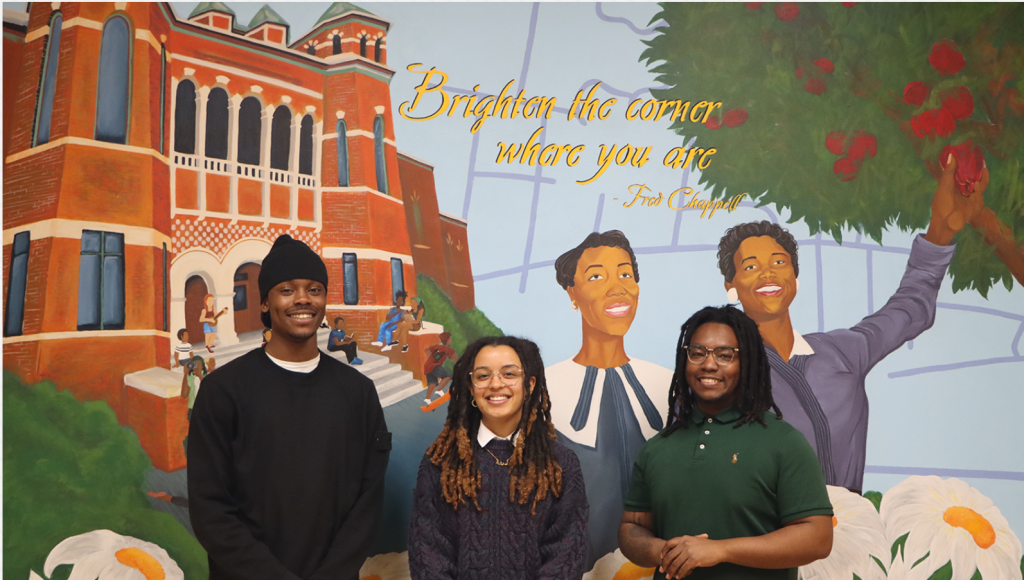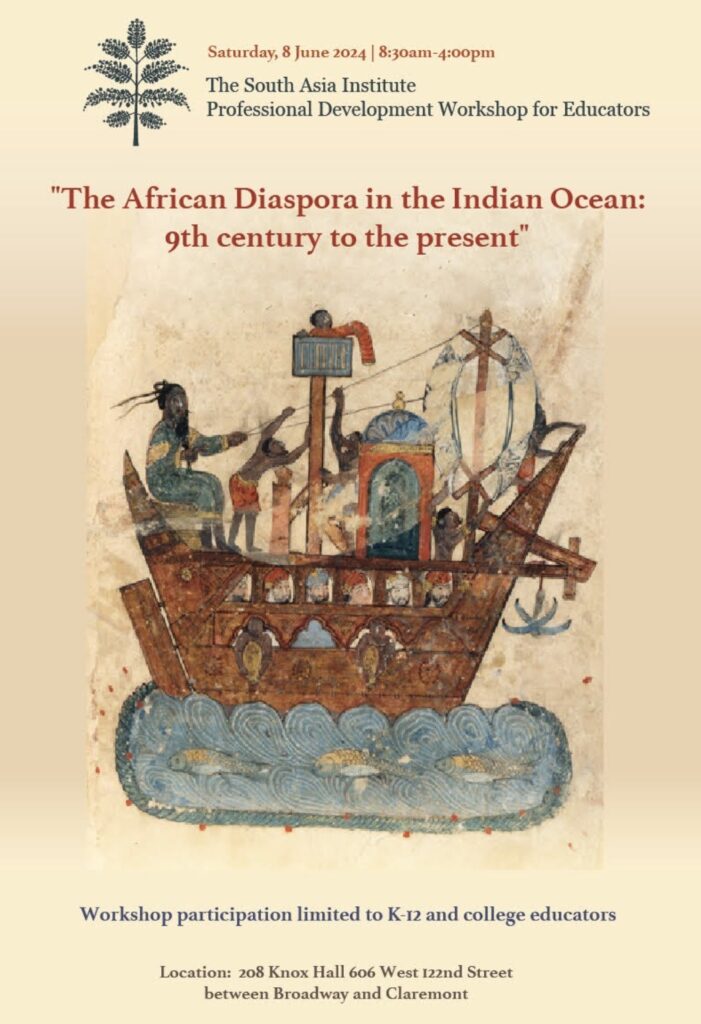Saturday, June 8, 2024
8:45am to 4:00pm
“The African Diaspora in the Indian Ocean: The Ninth century to the present”
A Professional Development Workshop for Educators

featuring
Omar H. Ali (Dean of Lloyd International Honors College and Professor of Comparative African Diaspora History at the University of North Carolina at Greensboro)
Jazmin Graves Eyssallenne (Assistant Professor, African American & African Diaspora Studies, at the University of North Carolina Greensboro)
Kenneth X. Robbins, M.D. (Independent Scholar & Archivist)
Beheroze Shroff (Documentary Filmmaker and Lecturer, Department of Asian American Studies, at the University of California, Irvine)
Location: Room 208 Knox Hall, 606 West 122nd Street, between Broadway and Claremont
Lunch will be provided to the participants.
There is no registration fee or cost to enroll in the program, but you must register in order to attend the workshop.
Co-sponsored by the Institute for African Studies and the Middle East Institute.
SCHEDULE
8:15 – 8:30am Coffee and Tea
8:30am – 8:45am Introduction by Jazmin Graves Eyssallenne
8:45am – 10:15am “The Abyssinian Defender of the Deccan: Malik Ambar and the Practice of Sabr“
Omar Ali (University of North Carolina at Greensboro)
East Africans and their descendants in South Asia—variously known as Abyssinians, Habshi, Kaffir, Siddi, Sidi, and Sheedi, among other terms—came from a range of spiritual traditions and adopted and created new ones of their own. The life of the Ethiopian Malik Ambar, among the best-known African Diasporic figures of the Indian Ocean world, who was enslaved, taken to Baghdad, adopted Islam, and became a Regent Minister in the western Deccan in the early seventeenth century, offers a way of exploring the dynamics of enslavement, faith, and power in the region during the early modern period. In one intriguing account by the Mughal envoy Mirza Asad Beg near the end of his life, Ambar joined his soldiers in common prayer. Might we view Ambar’s life through the framing of sabr, the term used by Muslims denoting and compelling patience and perseverance in the face of adversity? Might this be a way of better understanding how enslaved people drew on their faith to persist and even thrive in the face of seemingly insurmountable odds? This presentation will offer a brief history of Ambar’s life, the challenges he faced, and his accomplishments, framed within this concept and practice of sabr,to understand the spiritual lives and social realities of East Africans enslaved in the western Indian Ocean world from the 9th to 17th centuries.
10:15am – 10:30 Break
10:30 – 12:00pm: “Documenting Afro-South Asia in the Global African Diaspora”
Kenneth X. Robbins, M.D. (Independent Scholar & Archivist)
Studies on Afro-South Asia can be based on multiple themes: [1] the biographies of prominent Afro-South Asians including rulers, queens, and generals; [2] studies of the diverse Afro-South Asian communities; [3] encounters of Africans and African-Americans with South Asia and South Asian culture; [4] encounters of Indians across the globe with Africans and the African global diaspora; and [5] studies of “race”, “color”, “caste” and “class”. Documentation of elite figures includes everything from the coins of the 15th century Habshi Dynasty of Bengal and 17th Deccani Sultanate paintings of African strongmen, generals, and prime ministers to 19th-20th century photographs, paintings, and documents of the Nawabs of Janjira and Sachin. The lecture will demonstrate how diverse illustrations can be used to reveal specific themes: [1] the diverse nature of Islamic and Sufi practices of Afro-South Asians; [2] American jazz musicians, India, and Indian music; [3] India and prominent African-American clergy from Amanda Berry Smith to Martin Luther King; and [4] different approaches to questions of “race”, “color”, “caste” and “class”.
12:00pm – 12:45pm Lunch
12:45pm – 2:00pm “Imaging and Imagining Africa-India Connections”
Beheroze Shroff (Documentary Filmmaker, University of California at Irvine)
This presentation will focus on Siddis, Indians of African descent, in the state of Karnataka in Southwestern India. I briefly discuss the historical context of the Portuguese colonial presence in Southern India, by which Africans were brought into the Portuguese-ruled territory of Estado da India. During Portuguese rule and after the abolition of slavery, in the 1840s, Africans escaped to surrounding Southern Indian states. Many among them moved further into the hilly forest regions of Northern Karnataka, where large numbers of African-descended Siddis live today. After India’s independence from British colonialism, in 1947, the post-independent state considered the economically and socially marginalized community of Siddis as encroachers, in state-owned forest lands. However, in the 1980s, Siddis in Karnataka collectively organized and demanded recognition as an indigenous community of forest dwellers, within the state-designated status of Scheduled Tribe with rights to forest resources. My presentation will highlight the contradictions and struggles confronted by the contemporary Siddi community of Karnataka, through the profile of a Siddi woman, Juliana, who in contemporary India negotiates several issues such as deeply embedded color, caste and racial hierarchies. Although Juliana does not represent all Siddis, she represents the diversity among the Siddi communities of Karnataka today.
2:00pm – 2:15pm Break
2:30pm – 4:00pm “Strategies for Teaching the African Diaspora in India: Geography, Language, Religion”
In this workshop, Dr. Jazmin Eyssallenne will present key strategies for introducing learners, including self and others, to the African Diaspora in India. These strategies include familiarization with the geography, languages, and religions of the western Indian Ocean world as a way to understand the complex cultural identities of African-descended peoples in this region. The presentation will draw from Dr. Eyssallenne’s ethnographic research in Gujarat state and Mumbai city in western India to highlight the transformative potential of experiential learning to shape knowledge, develop cultural sensitivity and build bridges between communities
REGISTRATION
Participation in the workshop is limited to K-12 teachers, two- or four-year college instructors, or students planning a career in K-12 education who are enrolled in, or recent graduates of, a graduate degree program. If you would like to register for either workshop, or have questions, please contact William Carrick at wac2112@columbia.edu.
To register, please send an email to <wac2112@columbia.edu> which includes your name, school affiliation, level of students taught, and subjects taught. Students and recent graduates should include their school and degree program, anticipated graduation date, and a very brief statement of career goals.
There is no registration fee to attend the workshop, but registration is required in order to attend.
For additional information, please contact William Carrick at <wac2112@columbia.edu> or by phone at (212) 854-4565.
SPEAKER BIOGRAPHIES
Omar H. Ali is Professor of Comparative African Diaspora History and Dean of Lloyd International Honors College at the University of North Carolina at Greensboro. The author of Malik Ambar: Power and Slavery Across the Indian Ocean and Islam in the Indian Ocean World, as well as a co-editor of Afro-South Asia in the Global African Diaspora, he wrote the essays for “The African Diaspora in the Indian Ocean World,” an online exhibit of the Schomburg Center for Research in Black Culture of The New York Public Library featured as part of UNESCO’s “International Decade for People of African Descent.” A graduate of the London School of Economics and Political Science, he received his Ph.D. in History from Columbia University and was selected as Carnegie Foundation North Carolina Professor of the Year
Dr. Jazmin Graves Eyssallenne is an Assistant Professor in the African American and African Diaspora Studies Program and Lloyd Honors College at the University of North Carolina at Greensboro. Jazmin received her M.A./Ph.D. from the Department of South Asian Languages and Civilizations at the University of Chicago in 2021 and her B.A. from the Department of Middle Eastern, South Asian, and African Studies at Columbia University in 2013. Jazmin’s research centers on the Sufi devotional tradition of Muslim Sidis, Indians of African ancestry, in Gujarat and Mumbai. Jazmin’s research has been published in several edited volumes and journals, including Gender & Medieval Mysticism from India to Europe (2023) and Wonder in South Asia (2023). Jazmin co-edited the three-volume publication, Afro-South Asia in the Global African Diaspora (2020) with Omar Ali, Kenneth Robbins and Beheroze Shroff. In 2018, Jazmin was named one of the Most Influential People of African Descent under 40 for her participatory action research with the Sidi community of Ahmedabad, Gujarat.
Kenneth X. Robbins is a collector-archivist specializing in South Asia. Most of his exhibits and publications have dealt with local and regional rulers or minority groups. Dr. Robbins was co-curator of a New York Public Library Schomburg Center traveling exhibition Africans in India: From Slaves to Generals and Rulers, which has been shown worldwide at dozens of venues including the Indira Gandhi National Centre for the Arts, the United Nations, and UNESCO. He has published fifteen books including African Elites in India; and three volumes of Afro-South Asia in the Global African Diaspora including African Rulers and Generals in India; African Diasporan Communities across South Asia; and Black Ambassadors of Politics, Religion, and Jazz in India. He is working on the fourth volume, which is tentatively entitled “Bengalis” and “Africans” from the Indian Ocean World to the Americas and Back.
Beheroze Shroff is a Documentary Filmmaker and Lecturer in the Department of Asian American Studies at the University of California, Irvine. Long time scholar of the Sidi communities in Gujarat, Shroff has made five documentaries on contemporary Sidi culture and spiritual practice. Shroff has published several research articles on aspects of contemporary Sidi life. Her documentaries have been shown at the School of Oriental and African Studies in London, the Max Planck Institute in Germany, The Schomburg Center for Research in Black Culture, New York and at the Nairobi and Zanzibar International Arts and Music Festivals, among others.
READINGS
Ali, Omar H. ”Malik Ambar: Abyssinian Defender of the Deccan.” African Rulers and Generals in India. (Session One)
Burnett, Lynn. “African-Americans Make Contact with Gandhi: The 1930s.” Black Ambassadors of Politics, Religion, and Jazz in India. (Session Two)
Eyssallenne, Jazmin Graves. “Through the Eyes of the Lyre: A Transoceanic Perspective on the Sidi Sufi Devotional Tradition of Western India.” African Diasporan Communities across South Asia. (Session Four)
Shroff, Beheroze. “Juliana Siddi: Imaging and Imagining Africa-India Connections.” Black Ambassadors of Politics, Religion, and Jazz in India. (Session Three)
Above readings are all from Afro-South Asia in the Global African Diaspora, Volumes I – III. Edited by Omar H. Ali, Jazmin Graves Eyssallenne, Kenneth X. Robbins, and Beheroze Shroff. Greensboro, North Carolina and Ahmedadbad, India: The University of North Carolina at Greenboro Ethiopian and East African Studies Project and Ahmedabad Sidi Heritage and Educational Center.




